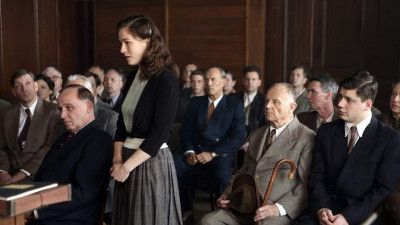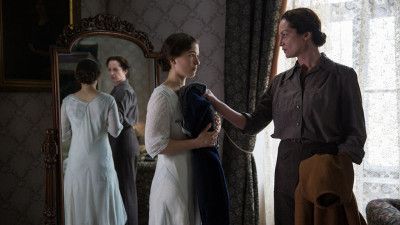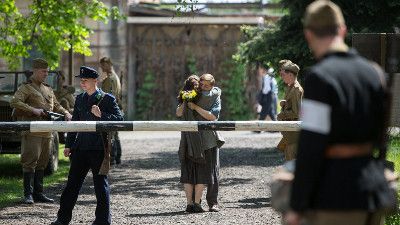The BEST episodes written by Gabriela Sperl

#1 - My Land, Your Land
Line Of Separation - Season 1 - Episode 3
In Part 3, “My Land, Your Land”, Anna and Friedrich are living on their small farm, which is barely capable of supporting them and their child. Lothar contributes significantly to the family’s subsistence through his cross-border smuggling and as a black marketeer. Four years later, in 1952 and during the Cold War, the East German Stalinists build a fence running across the whole of Germany. It goes through the middle of Tannbach, which lies within the five-kilometre protected area behind the fence. The entire population of the eastern part of the village is subjected to stringent security regulations. At this point, Liesbeth visits Tannbach from America, enthusiastically praising New York, where everyone can say what he or she wants and it “doesn’t matter whether anyone is a Jew or a Catholic”. She denies that anyone wants a new war: “You’ve all just talked yourselves into believing that.” No one watching Tannbach would know that the US had just initiated a bloody war against North Korea and China that claimed three-four million lives, that the American ruling elite was engaged in the ferocious, anti-democratic McCarthyite witch-hunts and that African Americans were subject to brutal apartheid conditions in the US South. A young East German border guard in Tannbach is shot and killed by West German border guards, leading to a tightening of border security. All people suspected of not being one hundred percent loyal to the Stalinist regime are forced to relocate away from the immediate border area or face prison if they oppose the evacuation order.

#2 - The Morning After the War
Line Of Separation - Season 1 - Episode 1
Part 1, “The Morning After the War”, begins in the last days of World War II. Just before US troops break into the estate of Count Georg von Striesow (Heiner Lauterbach), a young SS officer (David Zimmerschied) has the Countess (Natalie Wörner) shot because she refuses to betray her husband who has returned from the war as a deserter. The count was denounced by Franz Schober (Alexander Held), a prosperous farmer and fanatical Nazi, who immediately offers to serve the Americans with his meticulously recorded insider knowledge of Nazi members and their activities. The SS officer, Schober’s illegitimate son, is exposed to the Americans by his own mother, Hilde (Martina Gedeck). In any event, the US occupation is brief. Thuringia is assigned to the Soviet occupation zone, while Bavaria remains under American control. Soviet troops take over the village. Following a later revision of demarcation lines, US troops return to the western side of the village, which is divided down the middle. The Soviet soldiers are portrayed as violent thugs, taking revenge for the atrocities of the German military through rape and plunder. What the German troops have done in the east is not revealed until the third part of the trilogy. Schober’s firstborn son, returning late from the war, shouts into the count’s face that he himself had ordered massacres before deserting his command. In retaliation for the killing of German soldiers, entire village populations—men, women and children—were shot as partisans. One of the most powerful scenes in the first part includes the screening of a film recording the Americans troops’ liberation of Buchenwald concentration camp, which the Tannbach villagers are made to watch. Further plot developments focus on the count’s daughter, Anna (Henriette Confusius), and Friedrich Erler, the working class youth from Berlin. The young couple fall in love, hoping to find fulfilment in a new and better world, where there are “no top and no
Watch Now:Amazon
#3 - The Expropriation
Line Of Separation - Season 1 - Episode 2
Part 2, “The expropriation”, deals with land reform in the Soviet occupation zone. Landowners who possess more than 100 hectares [247 acres] of property, or who were members of the Nazi party and committed war crimes, are expropriated without compensation. The land is then divided into five-hectare [12-acre] portions and allotted to the so-called “new farmers”. The film fails to explain the brutal and reactionary role played by the Junker class (Prussian nobility) during the Wilhelmine Empire (1871-1918), the Weimar Republic (1919-1933) and the Nazis’ seizure of power in 1933. Instead, Count von Striesow (convincingly played by Lauterbach) is presented as not such a bad fellow, although he reacts to the expropriation of his estate as the worst injustice imaginable. After returning from POW incarceration in France, he refuses to accept that his daughter Anna has married Friedrich and is working with him to cultivate five hectares of land allocated to them from the Striesow family’s former estate.